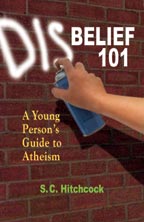 By James Zimmerman
By James Zimmerman
You're not going to learn anything new reading this book. But that's not an indictment of the book, no, it's a comment on your age. Disbelief is intelligently designed to appeal to the tween/early-teen crowd, and it does a superb job. Indeed, it is the best book on the topic of disbelief available for young people.
The author begins right away (well, after an introduction by Tom Flynn) by assuring young people who may be nervous reading such a book that he understands their fears. S. C. Hitchcock (writing under a pseudonym for the safety of his family) tells such readers that, if they take nothing else from the book, and if they are unable or unwilling to read anything else, to remember that there is no God. "Religion," he says, surely striking a nerve with everyone in his intended audience, "survives and is a huge force in the world because it relies on the indoctrination of children." It was this observation, Hitchcock noted in an interview, that drove him to write the book.
The book is divided into several brief chapters that build on each other, explaining the absurdity of believing in god(s). The book endeavors to shine light on the flaws of all religions, dwelling primarily on the three ‘great' monotheisms.
Disbelief beautifully addresses concerns and fears a young person may have regarding casting aside faith. It even advises youths on how to deal with their rational thinking, should they happen to live in a household where dissenting opinions are forbidden. For example, Hitchcock spends three pages calming his readers & telling them it's okay to set such ideas aside until they are free of well-intentioned care-givers who would likely not understand.
Additionally, the book devotes a chapter to debunking a few of the tired objections to evolution, such as the arguments that things are too complex to have evolved, that life violates thermodynamics, and the particularly silly argument that it's "just a belief".
Sprinkled throughout are references to things young people will understand. Disbelief includes dialogues between fictitious people to help illuminate more difficult ideas. It is also replete with examples that pointedly, simply, and humorously demonstrate the absurdity of religion - and especially the damaging belief that one religion is superior to all others. And, should all of this still be too much for a young person to grasp, Illustrator Leslie White's fifteen drawings interspersed in the book drive home each major point in an unforgettable (and often hilarious) manner.
Before ending with a helpful bibliography, Hitchcock makes the argument that, while physical abuse is not tolerated in this country, mental abuse gets a free ride: punch your kid in the face, he says, and the cops will come to your door. Tell them that god will burn them forever in hell if they don't accept Jesus into their heart, and everyone applauds your faith. Comparing religions to the marketing strategy of the fast-food industry, Hitchcock reiterates his original argument that if religions did not indoctrinate children, religion would cease to exist. That was a thought that even I - someone who left the teenage years behind quite a while ago - found stunning and insightful.
Do yourself a favor: buy a copy of this book. If you're too old to benefit from its arguments, give it as a gift to the young person in your life.
Visit www.disbelief101.com for more information, and to order the book.

